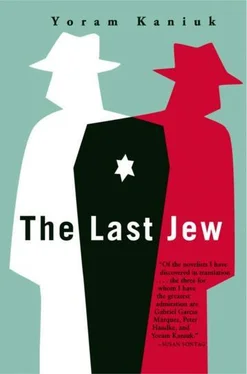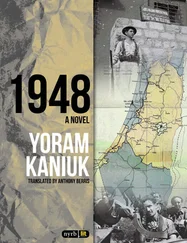Tape / -
I'm Ebenezer Schneerson. I am suddenly me. I don't remember a thing except what happened to me, like many people, I'm just another person, love wood, lacquers, love the smell of sawdust, everything has dropped off me, I'm talking into a tape, maybe for the last time in my life, afterward I have and will have nothing to say, nothing to recite, I look around, the world's grown old. Only now do I understand that the trees Dana planted are no longer saplings, that our new house is old now and old-fashioned and nobody lives there. I see Ahbed and I don't know if he's the son or the grandson or the great-grandson, I try to shut my eyes, concentrate, nothing comes, I'm left with myself alone, a cockroach, like everybody, in the backyard of my life, with Fanya R., with a certain, unclear future, for a while, I have no more memories of others I'm only for myself.
Tape / -
The moment I came back to what I left years ago, today I know, was the moment when they met above, above me, in that room in the Hilton, and I didn't know. I saw many lights-I didn't see the one light he stood in, he looked outside and suddenly if he had yelled at me, from the balcony of the seventeenth floor I would have gone on reciting for him, and so the door was opened and slammed and I was finished, as I started, with some slow and uncertain dying toward nobeing…
Tape / -
Mr. Ofen, Opal Books Ltd.
Sir:
Everything you have read so far, what I said, what I wrote, what Henkin says and wrote, everything was said by the man we're investigating, whose life we have tried to restore and understand. The words were all his, even my words were his: these hundreds of pages! Will I be able to interweave the book? Will Henkin and I succeed? From now on, I begin a series of hypotheses, from now on I no longer know things right. I gave you the things in their language reinvented by Ebenezer, most of them true, always recited, from now on I'm left with myself alone, Ebenezer is no longer who he was, even though he's still alive, and I have nothing but questions, amazement, I want to fill up the space, to grant you some authenticity, not to stumble, I've been here two months now, you call, my agent calls, I've got at least to know where the paths are leading that were paved by Ebenezer and now I have to walk on them with Henkin.
My son Friedrich we buried on a warm day, when a western wind blew and handsome pines sheltered us. Friedrich is buried next to Menahem Henkin. As far as I'm concerned, that fact has a kind of brazenness. The ceremony was modest, but not unemotional. Between the rocks, on the plain where the olive groves of Samaria and the vineyard of the Judean Mountains meet, in the steep and rocky mountain pass, the Teutonic lad who was my son is buried. Like the Crusader Werner from the city of Greiz who ascended to a temple that wasn't his. On my son's tombstone, only his first name is carved: Friedrich. At the ceremony, I read a chapter from Psalms and the monologue from Macbeth: Out, out, brief candle! Life's but a walking shadow, a poor player that struts and frets his hour upon the stage and then is heard no more. It is a tale told by an idiot, full of sound and fury, signifying nothing. For a long time we stood still, evening descended, the trees rustled in the wind, and that was the first time I felt I was leaving Friedrich in a place that was truly real and not only yearnings and deceitful geography. In the back of my mind I saw an ancient father as the Crusader Werner from the city of Greiz, who was brought to Jaffa on a mule along with the corpse of Gottfried of Bouillon and afterward his brother Beaudoin became great and was king of Jerusalem. I thought to myself, You're not a king here but a guest on probation, and your roots will be in the air with the treetops in the ground and maybe you'll learn, after death, to long for what you never reach. In some place I then understood Rebecca Schneerson, the daughter of his great-granddaughter, the daughter and wife of Secret Charity, her zealotry, her hatred, her beauty. No person who is pierced by a river can live among living people. And Friedrich came home, even though this may not be the home he expected.
What I can say for sure-and the very word "sure" becomes strange and elusive in my eyes-is that Samuel Lipker started searching for traces of himself in a city he knew well and whose language and forgiveness he knew in his blood.
Ebenezer, who stopped being the Last Jew, looks miserable. Something very defined, that sharpens differences, was erased from him. He's no longer a man of mystery, but an old man who wants to atone for what he sees as his unimaginably exaggerated testimony. Boaz and he sat and talked. Boaz told him how he came to be what he calls "a vulture," when all he really wanted to do was nothing, just live, as people just die, and here are all the committees and the commemorations and the memorials and memorial books and Noga and Jordana. They talked about Boaz's childhood, about the Captain who converted him to Christianity or perhaps didn't convert him to Christianity, there's nobody now who knows what really happened. The two of them left the room, something that seemed to glow all night was dulled now, and when Boaz went to celebrate what he called "his new freedom," and we, Renate, Hasha, and I, sat and talked with Ebenezer and made him hot tea, Samuel Lipker went to the Ministry of Defense to find out if a person of that name was killed in one of the wars. That seemed to be a rather logical step, but later on, when I found out about it, and today I can't say why, I thought maybe that was his last betrayal of logic. Jordana, who had recently returned to work, saw him and said: Boaz, what are you doing here? And I of course don't know if it was Samuel who was offended at hearing the name Boaz, or Boaz who was insulted when his father called him Samuel, but the reaction was the same, anger, embarrassment, pain, maybe even hope, so he smiled at her and took her to a small cafe, they talked and she said: If I had a neat room, if they had gotten me an established television, I could help people liberate them from dread, I'd look at the screen and they would be purified. Samuel Lipker grasped something we didn't, maybe that was a spontaneous response to the beauty of the swarthy queen of death, maybe it was the old thirst for dark ceremonies. He said: Stop playing the fool, maybe once you could cure people through a television set because you were sick and sick people can work miracles, but you're recovered now and you're dependent on your sickness, you're acting the woman who can help, but you know you can't anymore, that game is over. And when he hugged her at the entrance to the small office building surrounded by a garden heaped with papers and empty receipts, she felt, as she told me later, that she was hugged by Boaz, who once knew how to sleep with her, scold her, love her in his own way, but never hugged her, didn't envelop her in that longing that was in Samuel. She told him something strange, she said: That's exactly how the dead would hug me. He told her: I hug you because I'm a shadow of somebody and with me you can be free of your dependence on death, and Jordana saw, or felt, life, real life, the life people live before they die, starting to flow in her, to her, from her, and she smiled, maybe she was happy at everything there ever was, not because she loved somebody, but because she didn't have to love anybody to accept herself as she was.
I have no idea what Sam did in the next three days. I was busy with conversations with Henkin, I went to see the Museum of the Holocaust and Heroism, so I don't know how it happened or who really published the ad in the paper. Henkin thinks that Jordana, who still kept a key to Boaz's apartment, sneaked into the apartment, took an old picture of Boaz and printed the ad. Hasha, or perhaps it was Renate, is sure that Sam himself published the ad in the papers, while Henkin is sure it was Boaz. At any rate, the ad was published in the Friday papers, and it showed a photo of Boaz (or Samuel), with black tangled hair, burning eyes, and under the photo was the caption: Samuel Lipker, who came to Israel from Cyprus on May 14, 1948, is requested, for his own good, to come to room 1720 in the Hilton in Tel Aviv for his reward.
Читать дальше












